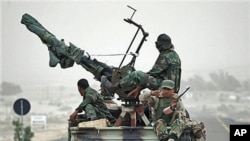As Libyan warplanes continue to launch new air strikes against areas under the control of opposition rebels, international debate is growing about whether a no-fly zone should be established over the country to protect civilians.
Some influential voices in the United States and international community are calling on the United Nations and NATO to consider establishing a no-fly zone over Libya, where the warplanes of the country's leader Moammar Gadhafi continue to bomb targets held by rebel forces.
U.S. Senator John Kerry, chairman of the Senate Foreign Relations Committee, said, "I believe that the global community cannot be on the sidelines while airplanes are allowed to bomb and strafe. A no-fly zone is not a long-term proposition, assuming the outcome is what all desire, and I believe we ought to be ready to implement it as necessary."
U.S. President Barack Obama said the world is outraged by what he called the "appalling" violence against the Libyan people and is urging Gadhafi to step down.
Obama says a no-fly zone is one of the options he is considering in order to stop the violence in Libya. He also is working with the international community to create solutions in case of a humanitarian disaster.
"There is a danger of a stalemate that, over time, could be bloody, and that is something that we are obviously considering," said the president. So what I want to make sure of is that the United States has full capacity to act, potentially rapidly."
In the 1990’s the international community imposed no-fly zones over Iraq and Bosnia-Herzegovina.
Related Carolyn Presutti Video Report
Analysts caution that any far-reaching military action against Libya would require a mandate from the U.N. Security Council. However, they say it is likely Russia or China would use their veto power to stop such a move.
U.S Secretary of State Hillary Clinton said Washington and its allies are considering a no-fly zone, but any American intervention in Libya would be controversial within Libya and the broader Arab community.
Clinton said that while the U.S. is a long way from making such a decision, all possibilities are under discussion. "We are taking no option off the table, so long as the Libyan government continues to turn its guns on its own people."
U.S. Defense Secretary Robert Gates said the military is working on a range of options, but emphasizes a no-fly zone in Libya would involve "a big operation in a big country."
Gates also said such a mission is complicated and would require a major air assault on Libyan military installations. "There is a lot of frankly loose talk about some of these military options and let’s just call a spade a spade, a no-fly zone begins with an attack on Libya to destroy the air defenses."
Analysts say nations on the U.N. Security Council are not likely to approve a no-fly zone unless there is a dramatic escalation of violence by the Libyan Air Force.
Still, opponents of Gadhafi in Libya are calling on western powers to conduct airstrikes to help them topple the dictator.
Robert Wexler, a former U.S. Congressman who currently is president of the S. Daniel Abraham Center for Middle East peace, said, "The inclination of many Americans, when they see a lunatic like Gadhafi engaging in violence against his own people, is to rush to help."
Wexler said while a no-fly zone sounds appealing to an international community eager to help Libyan protestors, the intervention of outside military force could actually weaken the rebels.
"The use of American engagement may actually undermine their efforts because today it is a homegrown effort. If they become allied with the United States, their effectiveness may be somewhat compromised."
Some European countries are drawing up contingency plans to prevent Gadhafi from using air power against his own people.
Arab League foreign ministers say they would consider backing a no-fly zone and will pursue talks on the best way to protect Libya’s citizens and guarantee their security.


















